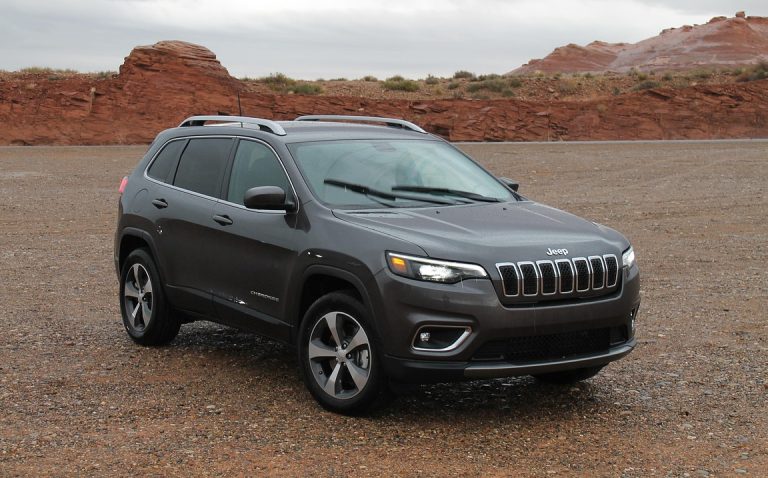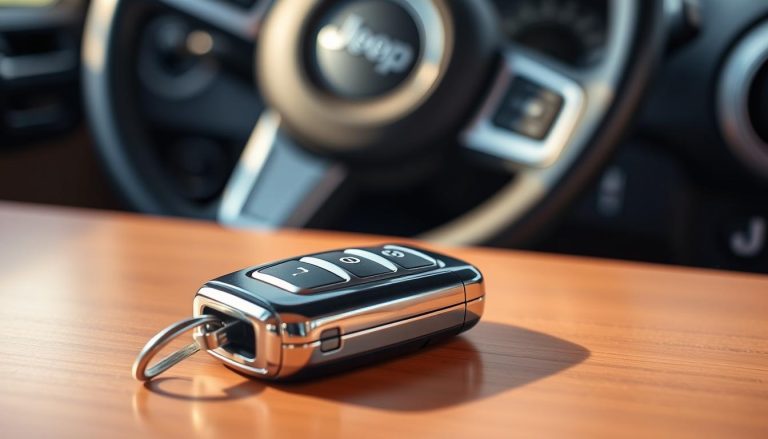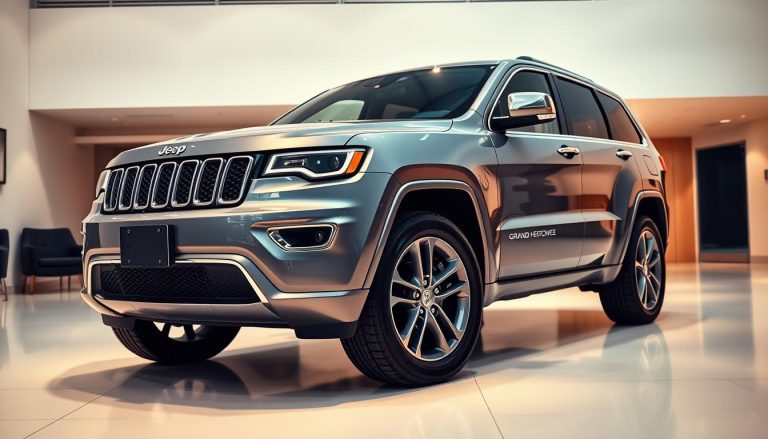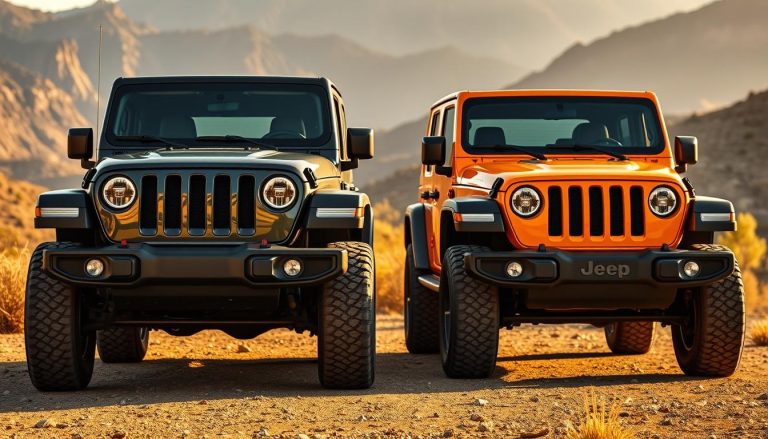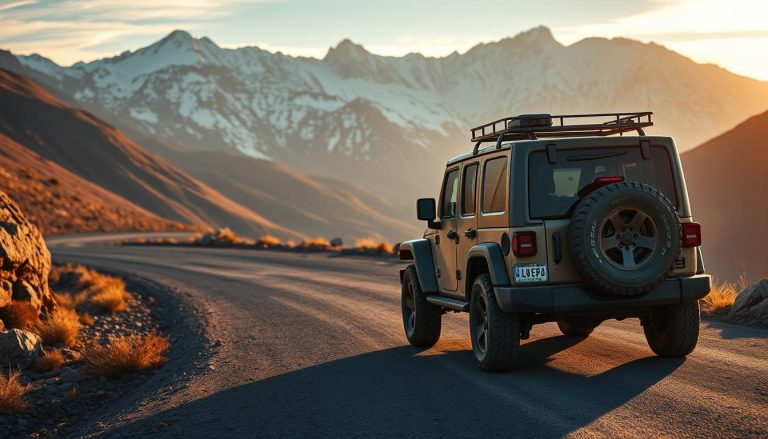Jeep Grand Cherokees Longevity: Mileage & Lifespan
The Jeep Grand Cherokee is known for its luxury and tough performance. It’s perfect for city driving and off-road trips. Knowing how long a Jeep Grand Cherokee lasts is key for buyers and owners.
We’ll explore the lifespan of a Jeep Grand Cherokee, looking at mileage and years of use. We’ll cover average mileages and tips for keeping your Jeep in top shape. This info will help you keep your SUV running longer.
The Average Lifespan of a Jeep Grand Cherokee
A Jeep Grand Cherokee can last between 200,000 to 300,000 miles on average. But, how long it actually lasts depends on a few key things. If you take good care of your Jeep and drive carefully, it can last longer. Not taking good care of it could lead to it breaking down sooner.
Factors Influencing Longevity
Several things can affect how long your Jeep Grand Cherokee lasts:
- Driving Environment: City driving with lots of stops may wear your Jeep out faster than highway driving.
- Weather Conditions: Extreme weather, like really hot or cold temperatures, can harm your car.
- Quality of Parts and Repairs: Using top-notch parts and skilled mechanics can keep your car running smoothly.
Routine Maintenance
Keeping up with regular check-ups is key to making your Jeep Grand Cherokee last.
- Regular Oil Changes: Changing the oil when needed is super important.
- Tire Maintenance: Keeping your tires in check helps with gas mileage and prevents wear.
- Mechanical Inspections: Fixing problems early by noticing warning signs can save your car from bigger issues.
Driving Habits
The way you drive can make a big difference in your Jeep’s lifespan. Keep these tips in mind:
- Gentle Acceleration: Don’t speed up or slow down too quickly. It’s tough on your car.
- Consistent Speed: Try to keep a steady pace on highways to reduce engine stress.
- Avoid Excessive Idling: If you’re stopped for awhile, shut off the engine to avoid extra wear.
By following these Jeep Grand Cherokee maintenance and driving tips, you can help your car last longer. This means you can enjoy your Jeep for many miles and years to come.
How Many Miles Can a Jeep Grand Cherokee Last?
Jeep Grand Cherokees are built tough. With proper care, these vehicles can often hit over 200,000 miles. Some even reach 300,000 miles, showing their lasting power.
High Mileage Expectations
To get your Jeep Grand Cherokee to last long, it needs regular care. Taking care of the engine, transmission, and the whole vehicle is key. This ensures it keeps running strongly for many miles.
Common Milestones for Longevity
Jeep Grand Cherokee owners celebrate big mileage achievements. Here are some key milestones:
- 100,000 Miles: Major services are key at this stage. They include timing belt replacements, checking all fluids, and inspecting brakes.
- 200,000 Miles: Reaching this point means your Jeep has been well cared for. It likely has had detailed maintenance, including suspension work, for continued smooth rides.
- 300,000 Miles: Hitting this milestone shows exceptional care. Keeping up with engine, cooling, and electrical systems is crucial for this achievement.
So, can Jeep Grand Cherokees last a long time? Yes, with the right maintenance, they are dependable for countless journeys. Their ability to endure is a testament to their build and reliability.
Routine Maintenance Tips for Extending Lifespan
To keep your Jeep Grand Cherokee running well, follow important maintenance steps. These steps make your car last longer and drive better.
Oil Changes
It’s important to change the oil in your Jeep Grand Cherokee regularly. Change the oil every 3,000 to 5,000 miles. This keeps your engine healthy and improves its performance.
Tire Rotation and Alignment
Don’t forget to rotate and check your tires’ alignment. Rotate your tires every 6,000 to 8,000 miles. This prevents uneven wear and makes tires last longer. Proper alignment also makes driving smoother and safer.
Brake System Checks
Checking your brakes often is crucial. These checks can catch problems like worn pads or leaks early. Good brakes mean a safer car.
| Maintenance Task | Frequency | Importance |
|---|---|---|
| Oil Changes | Every 3,000-5,000 miles | Prevents engine wear |
| Tire Rotation and Alignment | Every 6,000-8,000 miles | Enhances traction and stability |
| Brake System Checks | Frequently | Ensures safety and control |
Following these tips will make your Jeep Grand Cherokee last longer. Remember, regular oil changes, tire rotation, and brake checks are key. They’re the basics of car care.
Key Factors that Affect Jeep Grand Cherokee Durability
The Jeep Grand Cherokee’s durability depends on its use and driving locations. Two important factors are off-road use and how much weight it carries.
Off-Road Driving Impact
The Jeep Grand Cherokee shines off-road. But, this can shorten its life. Rough ground speeds up wear on its suspension, tires, and bottom. It’s key to maintain it well after such trips.
- Thorough cleaning to remove dirt and debris
- Inspection of the suspension system for any signs of damage
- Check and replace fluids, especially differential and transmission fluids
Load Carrying Considerations
How much the Jeep Grand Cherokee carries also affects its durability. Too much weight strains the suspension and transmission. Following the maker’s weight limits leads to longer lasting use. Spreading out the weight helps keep the vehicle stable and reduces early wear.
To handle weight right:
- Distribute weight evenly across the vehicle
- Avoid exceeding the gross vehicle weight rating (GVWR)
- Use appropriate towing accessories when hauling heavy loads
What is Considered High Mileage for a Jeep Grand Cherokee?
A Jeep Grand Cherokee with over 100,000 miles is often seen as high mileage. When a vehicle hits this point, it’s entering an important phase. Knowing how these Jeeps hold up over time and the right care needed is vital.
Performance at High Mileage
Once a Jeep Grand Cherokee passes 100,000 miles, you might notice some changes. But, these Jeeps are made to endure. With the right attention, they keep performing well.
Owners need to check the engine, fuel use, and how the car handles regularly. Many say their Jeep runs great even after 150,000 miles, especially with good upkeep.
Maintenance for High-Mileage Vehicles
Keeping a high mileage Jeep Grand Cherokee running takes consistent care. It’s all about checking it often and changing parts before they wear out. Good maintenance includes:
- Frequent oil changes to ensure engine lubrication.
- Regular tire rotations and alignments to distribute wear evenly.
- Comprehensive brake system checks to guarantee stopping power.
- Inspection of the suspension system to maintain ride quality and handling.
- Replacing aging spark plugs and timing belts to keep the engine running efficiently.
Adhering to these maintenance steps can greatly extend the life of your Jeep Grand Cherokee. It means enjoying reliable rides for many more miles.
Common Issues with Jeep Grand Cherokees
The Jeep Grand Cherokee is known for being tough. But it does have its share of problems. We’ll look at the most common issues like transmission problems, engine stalling, and troubles with the electrical system.
Transmission Problems
The transmission in the Jeep Grand Cherokee can give owners trouble. Many people talk about it shifting roughly, gears slipping, and slow engagement. These troubles often come from the transmission control module or old transmission fluid.
Engine Stalling
Jeep Grand Cherokee drivers often face engine stalling. It can happen for many reasons, like bad sensors, a failing fuel pump, or electrical problems. Regular checks and replacing parts when needed can help avoid this.
Electrical System Failures
The Jeep Grand Cherokee’s electrical system can fail in different ways. Issues might include a broken infotainment system, sensor errors, and the battery draining too fast. These problems usually happen because of bad wiring, software issues, or alternator faults. Keeping up with maintenance and fixing problems quickly can avoid these electrical issues.
How Long Do Jeep Grand Cherokees Last?
The Jeep Grand Cherokee has caught the attention of many for its lifespan. Owners share that with proper care, these SUVs can reach over 200,000 miles. A few have even lasted up to 300,000 miles. This shows how tough and dependable they are, making them a great choice for people wanting a car that lasts.
User Reports and Anecdotal Evidence
Looking at reports from car forums, it’s clear that regular upkeep is key for the Jeep Grand Cherokee. Owners emphasize the need for regular checks, immediate fixes, and quality parts. Their stories of reaching big mileage milestones support the SUV’s reputation for longevity.
Comparing With Other SUVs
In the world of SUVs, the Jeep Grand Cherokee is often praised for its durability. It often outshines rivals in terms of how long it lasts and the satisfaction it provides. This is evidenced by comparing it with other SUVs:
| SUV Model | Average Lifespan (miles) | User Satisfaction |
|---|---|---|
| Jeep Grand Cherokee | 200,000 – 300,000 | High |
| Ford Explorer | 150,000 – 250,000 | Moderate |
| Toyota Highlander | 200,000 – 300,000 | High |
This shows the Jeep Grand Cherokee matches or even surpasses other popular SUVs, with high satisfaction from owners.
Reliability Ratings Over Different Model Years
The dependability of the Jeep Grand Cherokee has changed a lot over the years. Studying these changes helps people decide which models are more reliable.
2011-2013 Models
The 2011-2013 models of the Jeep Grand Cherokee had several reliability issues. These included problems with how the transmission worked and electrical system failures. People often reported trouble with gear shifting and sudden electrical problems.
These older models needed more repairs. This made their reliability scores lower.
2014-Present Models
From 2014, the Jeep Grand Cherokee became much more reliable. Jeep made improvements in how they build cars and used newer tech to increase quality and reliability. The problems from before were greatly reduced.
Models from 2014 and later have better electrical systems and transmissions. This means owners report fewer issues.
| Model Year | Common Issues | Overall Reliability |
|---|---|---|
| 2011-2013 | Transmission, Electrical | Moderate |
| 2014-Present | Minor Electrical | High |
The Most Reliable Year for the Jeep Grand Cherokee
Finding the best Jeep Grand Cherokee year takes looking at user reviews and expert opinions. Many agree on which years are the most dependable and long-lasting.
The 2018 model is especially praised for its strong performance and few mechanical issues. Experts and drivers alike highlight its superior build and the smaller number of problems it has. Knowing this helps buyers choose a dependable car.
The table below offers a comparative look at multiple model years, highlighting key aspects of vehicle reliability:
| Model Year | Engine Performance | Transmission Issues | User Satisfaction |
|---|---|---|---|
| 2018 | High | Low | High |
| 2017 | Medium | Medium | Medium |
| 2016 | Low | High | Low |
Choosing the right Jeep Grand Cherokee year is key for reliability and happiness with your car. The 2018 model stands out as a top pick. It shows why doing your homework before buying a used car is vital.
Pros and Cons of Buying a High-Mileage Grand Cherokee
Buying a high-mileage Jeep Grand Cherokee can be savvy if you’re careful. But, it’s key to look at the good and bad sides carefully. Making the right choice can make it a smart buy.

Advantages of High-Mileage Models
Getting a high mileage Jeep Grand Cherokee can save you money. They’re often great deals if you’re okay with more miles. Plus, these Jeeps are known for lasting long and being reliable, if they’ve been taken care of.
Used Jeeps, even heavily used ones, are easy to fix and find parts for. This means fixing them can be easier on your wallet. Many also come with full service records, letting you see how well they’ve been kept up.
Disadvantages and Risks
Yet, there are downsides to these older Jeeps. Older vehicles might need more repairs, leading to higher upkeep costs. Such expenses can erase the savings you thought you had.
There’s also a risk of running into big repairs. Years of use might mean more problems with key parts like the engine. This could mean spending a lot on fixes.
It’s crucial to think over these points before buying a used Jeep. Checking the pluses and minuses closely helps you decide wisely. This way, you can enjoy all the benefits of your high-mileage Jeep Grand Cherokee without regret.
Maintenance Schedules and Best Practices
Keeping up with your Jeep Grand Cherokee’s maintenance schedule is key for its long-lasting performance and dependability. Following Jeep’s set maintenance plan and service times can really help extend your vehicle’s life and functionality.
Jeep Official Maintenance Schedule
Jeep offers a clear maintenance timeline, listing vital services and checks needed at certain mileage points. This includes routine oil changes, tire rotations, brake system reviews, and checking all fluid levels. Sticking to this timeline helps catch any wear and tear early, keeping your Jeep in top shape.
Recommended Service Intervals
It’s important to follow the recommended service times for your Jeep Grand Cherokee’s care. These intervals break down into:
- Every 5,000 to 7,500 miles: Oil and filter change, tire rotation
- Every 15,000 miles: Replace the engine air filter, inspect the brake system
- Every 30,000 miles: Replace fuel filter, inspect the suspension system, change transmission fluid
- Every 60,000 miles: Coolant replacement, inspect ignition system, replace spark plugs if necessary
- Every 100,000 miles: Replace timing belt, inspect and service the drivetrain components
By doing regular checks, driving carefully, and quickly handling any issues, you follow the Jeep Grand Cherokee maintenance plan well. This approach also makes sure your Jeep lasts longer and remains reliable, protecting your investment.
Jeep Grand Cherokee Transmission Issues
Jeep Grand Cherokee transmission problems can make owners upset. It’s smart to fix these issues early. This helps avoid bigger problems later. We’ll cover common signs and tips on how to keep your car running well.
Common Symptoms
It helps to catch transmission issues early in your Jeep Grand Cherokee. Here are signs to watch for:
- Erratic shifting
- Unexpected power losses
- Delayed gear engagement
- Strange noises during shifting
- Transmission warning light illuminated
Preventive Measures
Stopping transmission problems before they start is crucial. Here’s how to keep your car in top shape:
- Regularly check transmission fluid levels
- Use manufacturer-recommended transmission fluid
- Schedule routine transmission service
- Avoid aggressive driving habits
- Inspect and replace filters periodically
Watching your car’s condition and following a preventive maintenance plan can keep your Jeep Grand Cherokee’s transmission dependable and smooth.
How to Choose a Reliable Used Jeep Grand Cherokee
Buying a used Jeep Grand Cherokee requires thorough inspection to make a good investment. Focus on key areas during your inspection. This ensures you’re making a wise decision.
Inspection Tips
Start with a deep look at the car’s exterior and interior. Look for signs like wear and tear. Notice any paint issues, rust, or signs of accidents.
Checking the engine and undercarriage is also crucial. Watch for leaks or odd noises that mean engine trouble. Make sure the suspension, brakes, and all fluids are in good shape.
Reviewing the car’s maintenance history is key. Make sure the last owner kept up with oil changes, brake checks, and more. A good service record means the car was well cared for.
Red Flags to Avoid
Watch out for major issues that are deal-breakers, like transmission or engine problems. Also, look out for VIN problems or sketchy service records.
Be wary of bad undercarriage rust and mismatched paint, which could mean past accidents. Trust your gut and get a mechanic’s opinion if you’re unsure.
Impact of Driving Habits on Vehicle Lifespan
Your driving habits are super important for your Jeep Grand Cherokee’s life. Small changes in the way you drive can make a big difference. By being gentle when you start and stop, and not letting it idle too much, you can keep your Jeep running well for a long time.
Gentle Acceleration and Braking
Being gentle when you speed up and slow down is key to making your car last longer. When you rush to speed up, it’s tough on the engine, transmission, and other parts. Stopping too quickly wears out the brakes fast. If you accelerate and brake slowly, your Jeep won’t need repairs as often.
Avoiding Excessive Idling
Letting your Jeep idle too much can shorten its life. When it idles, the engine runs without cooling airflow, which can cause overheating and more wear. If you turn off the engine when you’re waiting around, like in a traffic jam or picking up a friend, it helps your engine and saves gas. Plus, new engines are made to start up often without getting damaged, so it’s a good habit to start.
Why Regular Oil Changes are Crucial
Having regular oil changes is key to vehicle maintenance. It’s all about making your engine last longer and run better. By changing your Jeep Grand Cherokee’s oil often, you make sure its engine parts are well-oiled. This reduces friction and prevents parts from wearing out fast.
As time goes on, engine oil can become dirty and less effective. Dirt, bits of metal, and other junk in the oil can cause more friction. This might harm your engine. Changing the oil regularly keeps it clean and the engine running well.
Also, fresh engine oil is good at taking heat away from important engine parts. It picks up heat and carries it off, which stops the engine from getting too hot. This is super important for keeping your car, like the Jeep Grand Cherokee, in good shape.
So, remembering to change your oil often is a big part of vehicle maintenance. It helps your engine work better and last longer.
Off-Roading and Its Effects on Longevity
Driving your Jeep Grand Cherokee on rough terrains is exciting. But, it demands a lot from your vehicle. To keep it running well and for a long time, you need good off-roading maintenance. Doing things like regular check-ups after trips and upgrading some parts of your Jeep are vital. These steps help your vehicle tackle the tough conditions of off-road adventures.
Post-Trip Maintenance Tips
After exploring tough trails, your Jeep Grand Cherokee requires careful attention. This ensures all parts work well. Important maintenance tasks after off-roading include:
- Thorough Cleaning: Clean mud and dirt off the undercarriage and wheel wells to stop rust.
- Inspect for Damage: Look for any damage to the suspension, exhaust system, and underneath protection.
- Fluid Levels: Make sure all fluids like engine oil, brake fluid, and coolant are full.
- Tire Check: Check the tire pressure and tread for signs of wear or punctures from rocks.
Recommended Upgrades for Off-Roading
Improving your Grand Cherokee with certain upgrades can boost its off-road performance and make it last longer. Think about these improvements:
- Reinforced Suspension Systems: Get strong shocks and struts for better control on uneven ground.
- Underbody Protection: Add skid plates and rock sliders to protect the undercarriage from hit and debris.
- All-Terrain Tires: Use tough, all-terrain tires for better grip and longer tire life.
- Enhanced Lighting: Put in quality off-road lights for better visibility at night.
Conclusion
To wrap up, taking care of a Jeep Grand Cherokee is key to its long life. Doing things like oil changes and checking the brakes helps a lot. Every effort, no matter how small, helps your Jeep last longer.
It’s also important to handle your Jeep in ways that fit its needs. If you drive off-road or carry heavy things, be extra careful. Keep up with regular check-ups and watch how it does as it gets older. This will help your Jeep stay strong for years.
Don’t forget, keeping your Jeep up-to-date with timely upgrades makes a big difference too. By taking good care and making smart choices, you can enjoy your Jeep Grand Cherokee for a long time. It’s all about being dedicated to looking after your Jeep.
FAQs
How long do Jeep Grand Cherokees last?
A Jeep Grand Cherokee can go from 200,000 to 300,000 miles. This depends on good care and smart driving.
What factors influence the longevity of a Jeep Grand Cherokee?
Its life can be swayed by how you drive, where you drive, staying on top of maintenance, and following the service schedule.
How many miles can I expect from a well-maintained Jeep Grand Cherokee?
With great upkeep, your Jeep Grand Cherokee could reach up to 300,000 miles.
What maintenance practices are essential for extending the lifespan of a Jeep Grand Cherokee?
Key upkeep includes changing the oil every 3,000 to 5,000 miles. You should also rotate and align the tires every 6,000 to 8,000 miles. Don’t forget to check the brakes often.
How does off-road driving impact the durability of a Jeep Grand Cherokee?
Off-road drives accelerate wear and tear. Make sure to do thorough post-trip checks to lessen their effect on your car’s long life.
What are common issues faced by Jeep Grand Cherokee owners?
Owners often deal with transmission glitches, engine stalling, and electrical problems.
Is buying a high-mileage Jeep Grand Cherokee a good idea?
Yes, a high-mileage Jeep Grand Cherokee costs less. However, it may need more fixes and could have more engine troubles.
What is the most reliable model year for the Jeep Grand Cherokee?
Jeep Grand Cherokees made after 2014 are generally more reliable. This is thanks to better building methods and tech.
How important are regular oil changes for my Jeep Grand Cherokee?
Oil changes are key. They lessen engine wear and keep your Jeep running smoothly for a longer time.

